Buy Trauma-Related Dissociation and Dissociative Disorders -Assessment and Treatment Strategies for Some of the Most Misunderstood Disorders in the DSM – Greg Nooney Course at GBesy. We actively participate in Groupbuys and are committed to sharing knowledge with a wider audience. Rest assured, the quality of our courses matches that of the original sale page. If you prefer, you can also buy directly from the sale page at the full price (the SALEPAGE link is directly provided in the post).
Trauma-Related Dissociation and Dissociative Disorders -Assessment and Treatment Strategies for Some of the Most Misunderstood Disorders in the DSM by Greg Nooney,
Salepage link: At HERE. Archive:
- Faculty:
- Greg Nooney
- Duration:
- 6 Hours 5 Minutes
- Format:
- Audio and Video
- Copyright:
- Sep 25, 2018
Description
You work with trauma to make a difference.
But developmental trauma and disorganized attachment have profoundly negative effects on those who experience them — and the signs and symptoms of dissociation can be difficult to recognize, even for clinicians.
And many people with trauma-related dissociation and dissociative disorders actively work to hide their struggles; stigma and shame driving their secrecy and barring them from sharing the full extent of their distress with you. Frightened and confused, many become “revolving door” patients, in and out of the mental health system when the root of their problems can’t be identified.
They are in desperate need of your help.
This recording will prepare you to effectively meet the clinical challenges involved in identifying and treating individuals across the dissociative spectrum.
Key Benefits:
- Specialized methods for assessing clients with severe trauma who may be dissociating.
- Maximize attunement with dissociated clients while maintaining therapeutic boundaries.
- Step-by-step processes that effectively create and sustain an atmosphere of trust and safety.
- Detailed guidance on therapeutic interventions to calm and ground dissociative clients.
- Skills to help you prevent and manage suicidal crises.
- Treatment techniques from Trauma Focused CBT, EMDR and somatic approaches.
Don’t miss out on this chance to add valuable skills and tools to your trauma practice and ensure those seeking your help don’t become “revolving door” patients.
Purchase this recording today and provide hope and healing to those with trauma-related dissociation and Dissociative Disorders!
Handouts
| Manual – Trauma-Related Dissociation and Dissociative Disorders (2.64 MB) | 84 Pages | Available after Purchase |
Outline
Developmental Trauma, Symptomology and Risk Factors
- The role of early traumatic stress and insecure attachment
- Types of Dissociative Disorders and symptomology
- Dissociative Amnesia, Depersonalization Disorder,
- Dissociative Identity Disorder
- Populations at risk for dissociative issues
- The controversy – misconceptions and false memories
Clinical Assessment Tools for Trauma and Dissociative Disorders
- Adult Attachment Interview
- Adverse Childhood Experiences Questionnaire
- Dissociative Experiences Scale
- Identifying co-occurring disorders
- Avoiding false negatives and false positives in diagnosing DID
Problems and Solutions in the Treatment of People with Dissociative Disorders
- Maximize attunement with clients who are dissociating
- Getting client buy in
- How to establish trust and cooperation
- Manage issues that can interfere in therapy
- Compassion fatigue
- Modulating your own reactions
- The dangers of vicarious trauma
- Identify and address implicit biases
- Maintain therapeutic limits and boundaries
- Engagement of alternate identities in DID
Therapeutic Techniques that Develop Stability and Safety for Dissociating Clients
- Calming practices to ground the dissociative client
- Conscious breathing
- Relaxation techniques
- Mindfulness
- Working with clients facing continued abuse
- Techniques to manage suicidal crises – account for the suicidal alter
- Don’t let “crises of the week” keep you from reaching treatment goals
- Build support systems with WRAP plans (Wellness Recovery Action Plan)
Specific Trauma Work for Dissociative Disorder Treatment Plans
- Differences in working with DID clients
- The role of resourcing in trauma
- Calm clients and create personal safety with TF-CBT
- Eye Movement Desensitization and Reprocessing (EMDR)
- Somatic approaches – connect memory to the body
Limitations of the Research and Potential Treatment Risks
- Feasibility of randomized prospective double-blind placebo-controlled studies
- Ethical, financial, and logistical constraints
- Trauma, disorganized attachment and research data
- Potential risks in treating trauma and Dissociative disorders
Faculty
Greg Nooney, LISW Related seminars and products: 1
Narrative Space LLC
Greg Nooney, LISW has worked with seriously mentally ill individuals for over three decades and has received specialized training in treating severely dissociated clients. He has worked with clients with dissociative disorders throughout his career and has a special passion of helping other clinicians learn effective ways to treat these individuals. Greg has taught workshops and conferences on ethics, narrative therapy practices, treating severe trauma, and burnout.
He has worked in mental health centers, in private practice and most recently at Burgess Hospital in Onawa where he was the director of the mental health section for ten years. He is an adjunct instructor at the University of Iowa School of Social Work and regularly teaches a class on the DSM to graduate students. Greg has also been a field instructor for Masters of Social Work students at the University of Iowa, University of Nebraska, and the University of North Carolina.
He began working in the mental health field in 1971, working in rehab centers and psychiatric hospitals. Greg earned his Masters in Social Work from Loyola University in Chicago in 1983.
Speaker Disclosures:
Financial: Gregory Nooney is the director for Burgess Mental Health. He receives a speaking honorarium from PESI, Inc.
Non-financial: Gregory Nooney is a member of the National Association of Social Workers.
Buy the Trauma-Related Dissociation and Dissociative Disorders -Assessment and Treatment Strategies for Some of the Most Misunderstood Disorders in the DSM – Greg Nooney course at the best price at GBesy.. After your purchase, you will get access to the downloads page. You can download all the files associated in your order at here and we will also send a download notification email via your mail.
Unlock your full potential with Trauma-Related Dissociation and Dissociative Disorders -Assessment and Treatment Strategies for Some of the Most Misunderstood Disorders in the DSM – Greg Nooney courses. our courses are designed to help you excel.
Why wait? Take the first step towards greatness by purchasing Trauma-Related Dissociation and Dissociative Disorders -Assessment and Treatment Strategies for Some of the Most Misunderstood Disorders in the DSM – Greg Nooney courses today. We offer a seamless and secure purchasing experience, ensuring your peace of mind. With our trusted payment gateways, Stripe and PayPal, you can confidently complete your transaction knowing that your financial information is protected.
Stripe, known for its robust security measures, provides a safe and reliable payment process. With its encrypted technology, your sensitive data remains confidential throughout the transaction. Rest assured that your purchase is protected.
PayPal, a globally recognized payment platform, offers an additional layer of security. With its buyer protection program, you can feel confident in your purchase. PayPal ensures that your financial details are safeguarded, allowing you to focus on your learning journey.
Is it secure? to Use of?
- Your identity is completely confidential. We do not share your information with anyone. So it is absolutely safe to buy the Trauma-Related Dissociation and Dissociative Disorders -Assessment and Treatment Strategies for Some of the Most Misunderstood Disorders in the DSM – Greg Nooney course.
- 100% Safe Checkout Privateness coverage
- Communication and encryption of sensitive knowledge
- All card numbers are encrypted using AES at relaxation-256 and transmitting card numbers runs in a separate internet hosting atmosphere, and doesn’t share or save any data.
How can this course be delivered?
- After your successful payment this “Trauma-Related Dissociation and Dissociative Disorders -Assessment and Treatment Strategies for Some of the Most Misunderstood Disorders in the DSM – Greg Nooney course”, Most of the products will come to you immediately. But for some products were posted for offer. Please wait for our response, it might take a few hours due to the time zone difference.
- If this happens, please wait. The technical department will process the link shortly after. You will receive notifications directly by e-mail. We appreciate your wait.
What Shipping Methods Are Available?
- You will receive a download link in the invoice or YOUR ACCOUNT.
- The course link always exists. use your account to login and download the Trauma-Related Dissociation and Dissociative Disorders -Assessment and Treatment Strategies for Some of the Most Misunderstood Disorders in the DSM – Greg Nooney course whenever you need.
- You only need to visit a single link, and you can get all the Trauma-Related Dissociation and Dissociative Disorders -Assessment and Treatment Strategies for Some of the Most Misunderstood Disorders in the DSM – Greg Nooney course content at once.
- You can do your learning online. You can be downloaded for better results and can study anywhere on any device. Make sure your system does not sleep during the download.
How Do I Track Order?
- We always notice the status of your order immediately after your payment. After 7 days if there is no download link, the system will automatically complete your money.
- We love to hear from you. Please don’t hesitate to email us with any comments, questions and suggestions.
![GBesy [GB] GBesy [GB]](https://www.gbesy.com/wp-content/uploads/2023/05/gbesy-Logo-full-100.png)
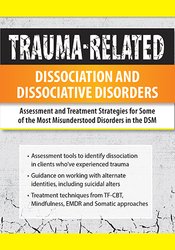
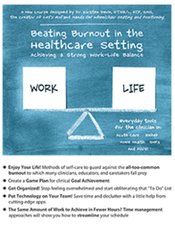
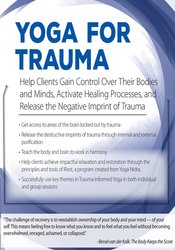
 Purchase this course you will earn
Purchase this course you will earn 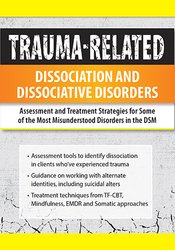
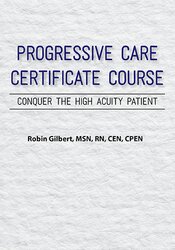
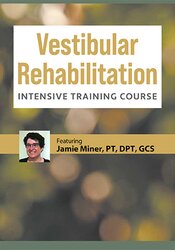
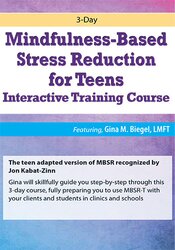
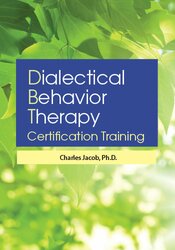
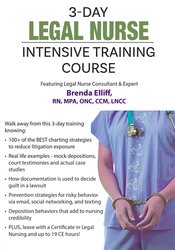
Reviews
There are no reviews yet.